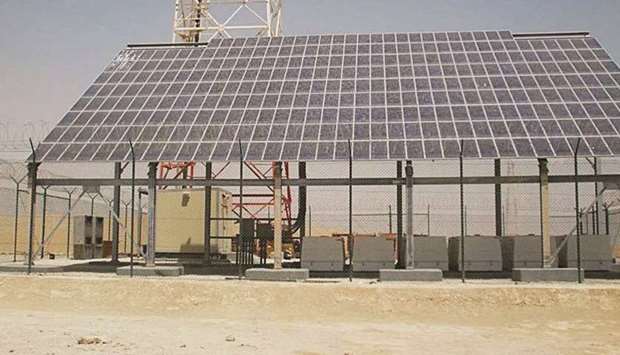Qatar may transform itself into a world leader in solar technology with the Al Karshaah solar project and potential PV developments in the country, Oxford Business Group has said in a report.
In line with Qatar’s strategic interest in reducing natural gas consumption, and as a reflection of the decreasing cost of solar technology, the country’s first utility-scale solar power project is approaching kick-off, OBG said in its The Report: Qatar 2020.
In January, the country had signed an agreement with a consortium consisting of France’s Total and Japan’s Marubeni. Built on a 10-sq-km plot in the Al Kharsaah district west of Doha, the 800-MW plant will provide as much as one-10th of Qatar’s peak energy demand when fully operational, and is expected to require investment totalling QR1.7bn.
Siraj Solar Energy, a joint-venture company established by Qatar Petroleum and QEWC, will control 60% of the solar plant. Of the remaining 40% stake, Marubeni will control 51% and Total will take 49%.
The project will be developed following a build-own-operate-transfer model, with the plant reverting to Kahramaa after 25 years. The first 350-MW tranche of the project is scheduled to come on-line in the first quarter of 2021, with full commercial operations of the 800-MW plant beginning in time for the 2022 FIFA World Cup.
Research and data-gathering on the suitability and performance of solar technology for Qatar’s weather conditions are ongoing, with the Qatar Environment and Energy Research Institute (QEERI) reported to have been testing 26 manufacturers’ models at a 35,000-sq-metre site since 2013, OBG noted.
According to QEERI’s senior research director, Veronica Burmudez Benito, the impact of “high-UV, high-temperature, high-humidity, high-salinity and high-soiling” conditions has mostly not been taken into account in photovoltaic (PV) manufacturing thus far, and the research project fills an important gap in that sense.
“Being home to such harsh conditions, Qatar is looking to become a centre for solar PV research, expanding use of the green technology beyond the more temperate environments of Western Europe and North America where solar panels have been more widely implemented,” OBG said.
QEERI looked to commercialise its research operations with the 2018 establishment of the QEERI Solar Consortium, compromising Kahramaa and private sector players Q Cells, DSM, Total and Nice PV Research.
Benito said the consortium’s functions would be two-fold, according to OBG.
The first is conducting tests in harsh desert conditions and providing proprietary data for manufacturers and researchers; the second is carrying out research projects sharing the findings.
The consortium is also looking to expand by bringing in fellow research groups, manufacturers, tool-makers and materials firms.
In other alternatives to hydrocarbons, the local research branch of Total announced projects investigating and developing clean energy solutions in November 2019, two of which centre on the potential of Qatari microalgae as biofuel and carbon-capture material, OBG noted.
Total Research Centre Qatar’s director, Yousef al-Jaber said the centre would collaborate with Qatar University on the microalgae projects, while Hamad Bin Khalifa University’s Qatar Environment and Energy Research Institute would be its partner on another research project on exploring clean energy solutions.

A solar power generating facility in Qatar (file). Qatar may transform itself into a world leader in solar technology, Oxford Business Group has said in a report.

